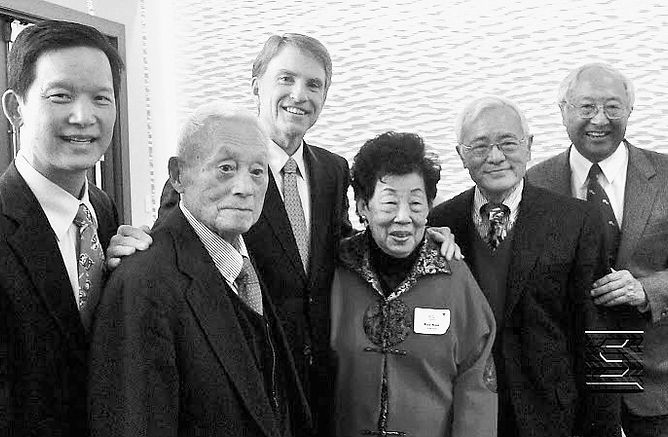History of the 1990 Institute
The 1990 Institute was founded by a group of prominent academic, business, and community leaders with a deep interest in good U.S.-China relations. We began as an economic and social research think tank aimed at assisting China in its period of modernization. We hosted numerous scholar conferences and joint research projects with the Federal Reserve Bank, among other groups. We also funded Chinese scholars that were in the States at that time to collaborate with U.S. experts in writing a number of reports and issue papers on monetary and social reforms. In 1994, our U.S.-China collaborative research report called China Economic Reform, was presented to President Jiang Zemin at a large convention and was well-received. It later became a textbook in Stanford’s economics courses.
In our second decade, we shifted our focus to doing projects in China by collaborating with the All China Women’s Federation (ACWF). Our major programs include the Spring Bud Girls Education program where 1000 girls from very poor rural families were given an all expenses paid scholarship to attend, starting from the 3rd grade until college graduation, as long as they are able. (Over 175 girls have graduated from college.) Our microfinance program helped a rural microfinance operation (Pucheng Women’s Sustainable Developed Association) to go from negative cash flow to fully sustainable. This organization was recognized by the Chinese Government as a model microfinance operation. We also partnered with the China National Children’s Center to conduct a number of U.S.-China children’s exchange programs, starting with a Children’s Art on the Environment competition, where over 1 million children all over China participated.

From left to right: Wei-Tai Kwok, C.B. Sung, Steve Westly, Roz Koo, Hang-Sheng Cheng, Billy Lee
In our third decade, as China has developed economically and brought hundreds of millions of its people into the middle class, we felt that there was more need to educate young Americans about China. Very little about modern China has been taught in our secondary schools! So in 2013, we started an annual two-day teachers workshop for 6-12 teachers called CHINA NOW | For Teachers. This program is still running except we are now partnering with Asia Society of Northern California to produce this workshop. For 4 years we have also conducted a nation-wide video contest called Youth Voices on China. A College Essay Contest was started in 2019.
Starting in this fourth decade, faced with a growing adversarial relationship between the U.S and China, coupled with the Covid-19 pandemic, there has been an increase in anti-Asian American sentiment in the U.S. Because of this, the 1990 Institute intends to focus its work on educating the American public on how Asian social mores are similar or different from those of the predominant U.S. society. We will also be illustrating how Asian Americans are an integral part of the American heritage.
Our Founders
The 1990 Institute was founded in 1990 by C.B. Sung, Hang-Sheng Cheng, William Lee, Roz Koo and and a group of prominent American business, academia, and community leaders. They were all deeply interested helping the people of China modernize and address its social & economic challenges through productive dialogue — but wanted to avoid getting in the politics of either China or the United States.
Founding Chairman C.B. Sung, the founder and Chairman of Unison Group, was renowned for brokering nearly 40 Sino-foreign joint ventures in China. Dr. Hang-Sheng Cheng, served as the Director of the Center for Pacific Basin Studies at the Federal Reserve Bank in San Francisco. Roz Koo was the founding President of Self-Help for the Elderly, and Billy Lee was a prominent architect who developed numerous cultural exchange programs.

C.B. Sung
1990 Institute Co-Founder

Hang-Sheng Chen
1990 Institute Co-Founder

Rosalyn Koo
1990 Institute Co-Founder

William M.S. Lee
1990 Institute Co-Founder
There four incredible founders had the foresight, perseverance, relationships, and leadership to establish 1990 Institute during a period when people-to-people interactions were sorely needed to supplement and assist government-to-government discussions. They galvanized the support of university presidents across the U.S., including Donald Kennedy of Stanford, Stephen Muller of Johns Hopkins, Harold Shapiro of Princeton, and Chang-lin Tien of UC Berkeley.
During these early years, the1990 Institute also received advice and support from prominent U.S-China figures, including:
-
Robert Scalpino, the National Committee of U.S.-China Relations’ first chairman;
-
Philip C. Habib, Under Secretary of State for Political Affairs (under President Reagan)
-
Tung-Yen Lin, the renowned bridge builder
-
Robert Parry, President & CEO Federal Reserve Bank of San Francisco
-
Linda Tsao Yang, former U.S. Ambassador, Asian Development Bank
Over the next 30 years, the Founders and subsequent Board members, officers, staff, and volunteers joined together to implement many interesting, informative, and impactful programs in both China and the United States. Today, Roz Koo and Billy Lee remain as Emeritus Directors. They are joined by a distinguished group of Honorary Board Chairs including:
-
Dr. Robert T. Parry, President, Federal Reserve Bank of San Francisco
-
Dr. Harold T. Shapiro, President Emeritus, Princeton University
-
Senator Adlai E. Stevenson III, Former U.S. Senator (D. Illinois)
-
Ambassador Linda Tsao Yang, Former U.S. Ambassador, Asian Development Bank